A young boy in a remote village in Tamil Nadu carefully places a VR headset over his eyes. Instantly, his world transforms from a modest classroom with chalk-dusted blackboards to a futuristic landscape filled with coding simulations and immersive virtual experiences.
This isn’t a distant dream but a reality made possible by 22-year-old Harshini Kishore Singh, an entrepreneurship graduate, bridging the digital divide for rural children in India.
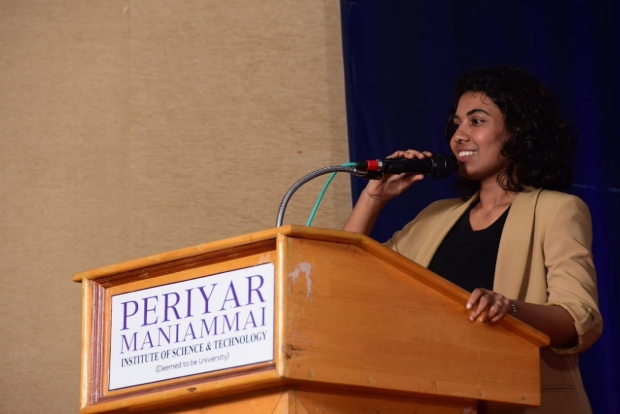
Harshini, originally from Madurai, is the founder of Rural Tech Rise, an initiative dedicated to bridging the digital and entrepreneurial divide for underprivileged children. By day, she trains and educates young minds; by night, she works as an IT employee to fund her mission.
From gift-making to providing the gift of knowledge
Harshini’s entrepreneurial spirit ignited early. At the age of 16, she started her first venture in corporate gifting. “I’ve been working different jobs since I was 14,” she says. During the pandemic, she personally delivered 100 Diwali gifting boxes, an experience that shaped her understanding of business and resilience.
“My first venture failed due to the lack of exposure and knowledge, but that failure pushed me to pursue entrepreneurship as a college degree,” she recalls.
Moving to Bengaluru for college in 2021 further refined her perspective. “Initially, business was all about profit and margins for me. But in college, things changed,” says Harshini. “We had evening classes from 4 to 8 pm, while mornings were spent on internships and brainstorming entrepreneurship ideas,” she shares, who pursued her BBA in entrepreneurship from Jain (Deemed to be University).
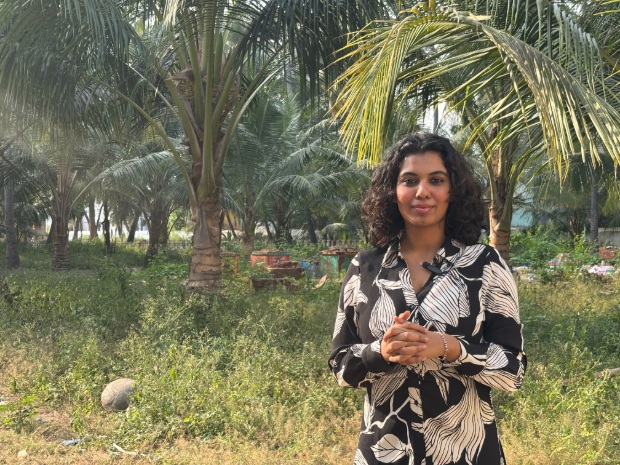
She also undertook a leadership CSR project, volunteering with Teach for India for 50 hours at a government school, teaching ‘social emotion’, which proved to be a turning point in her life. “I worked with children who had no parents, no background, and sometimes no home. That experience made me realise the deep gaps in Indian education,” she says.
She used her savings from various jobs she undertook, including a stint at the Google Operations Centre in Bengaluru at age 18, where she was the youngest employee with a package of Rs 9 LPA. She invested her earnings to achieve her education mission.
“I wanted to go beyond teaching social emotions for the children. The class I taught roughly had 30 children and I was able to improve their quality of living. Most of the children came from poor and abusive family backgrounds,” shares Harshini.
“I was able to help these children to understand education and society better. This created the drive to make efforts to transform other children’s lives as well,” adds Harshini.
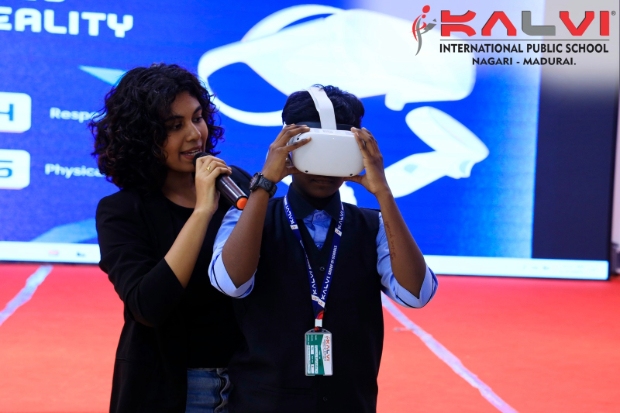
Recognising the increasing threat of cybercrimes, she worked actively in DigiSafe, a company founded by her sister, Sushmitha Kishore Singh. This initiative focused on educating government and private school children about internet safety and helping them navigate through the digital world responsibly.
“To add credibility to my work, I also became a certified Cyber Crime Intervention Officer,” says Harshini, a qualification required to formally teach cybersecurity to children. Through DigiSafe, she conducted training programmes, making young minds aware of online threats and equipping them with the tools to protect themselves.
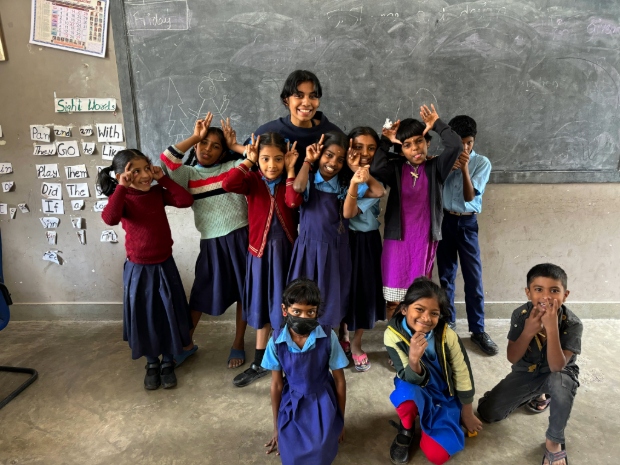
“Harshini took responsibility for Digisafe when I had to move abroad for my masters and things were functioning smoothly because of her. For example, we had taken up a project of creating 100 videos for the CBSE school children which Harshini executed really well,” shares Sushmitha.
While running DigiSafe, Harshini realised that rural children lacked access to even the most basic digital tools, let alone cybersecurity education. This insight led her to establish Rural Tech Rise, an initiative introducing technology education to underprivileged students.
From setting up mobile libraries filled with books to bringing cutting-edge tools like VR and robotics into classrooms, her work has transformed learning experiences for thousands of children.
The birth of Rural Tech Rise
Founded in 2024 and registered recently, Rural Tech Rise extends digital literacy and entrepreneurship training to children in rural communities. Building on her experience with Digisafe, Harshini established this initiative to introduce children from rural communities to virtual reality (VR), artificial intelligence (AI), and cybersecurity.
“We take VR headsets to rural schools, which we have received from an Australian University, letting children experience technology hands-on. They are fascinated because they’ve only seen such tech on YouTube, but never had access to it,” she explains.
“We also develop our own curriculum to teach the children,” shares Harshini, who uses the power of community language to ensure the children understand the concepts well. “We don’t use any technical jargon as sometimes these children don’t have access to normal education,” Harshini adds — something that their team is striving to balance out.
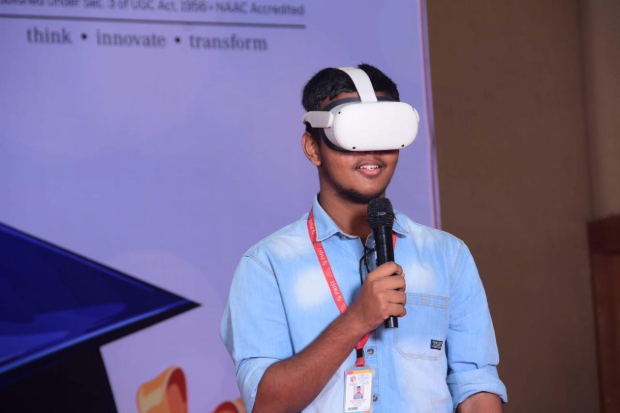
Certified by ISAC (Information Sharing and Analysis Centre), Harshini and her team led workshops on ethical hacking awareness and digital security. “During our sessions, children have come forward admitting they’ve sent inappropriate pictures online, later finding them misused. We contacted ISAC and helped resolve such cases, making it a lesson for them,” she explains.
They also conduct live ethical hacking demonstrations, showing students how one mistake — like clicking an unknown link — can compromise their internet safety and device protection.
Building young entrepreneurs
Rural Tech Rise also includes entrepreneurship training for schoolchildren, focusing on fostering a business mindset rather than a job-seeking mentality.
One of Rural Tech Rise’s most innovative aspects is its Shark Tank, a pitching round launched in 2024 in Sholavandhan, Madurai. “We hold pitching rounds in rural areas, awarding cash prizes for the best ideas. After every training session, kids present their business ideas, and they take it seriously,” Harshini shares.
“I want to introduce the idea of entrepreneurship to these kids, and I also want them to focus on the impact and not just the money-making aspect,” shares Harshini.
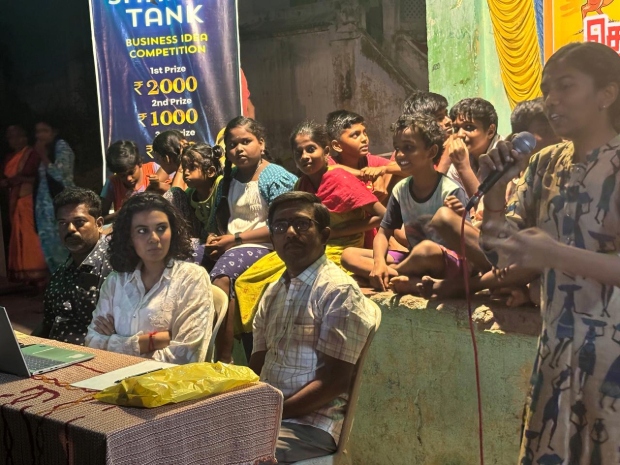
Her team consists of 10 core members — all school students from classes 7 to 9 — whom she trained. “They have their ventures established and registered. One boy teaches people through magic. A girl wants to set up a hair salon. They should not just work for profit but understand their purpose,” she explains.
Thirteen-year-old Dharun finds Harshini’s guidance to be insightful. “Before the session, I only had the idea of doing something with magic. It was Harshini ma’am who guided me to add the element of education and teaching science experiments into my love for magic,” shares Dharun, the founder of Magic Net — an initiative that teaches kids science through the help of magic.
With the correct guidance, Dharun has been able to teach over 40 children the beauty of science through the illusion of magic. “By working with Ma’am, I get to learn a lot more about entrepreneurship and what I can do with it when I grow up,” shares Dharun.
Overcoming challenges and expanding the mission
Harshini acknowledges the difficulties in gaining community trust. “Many think we’re here for publicity, so registering the company gave us credibility,” she says. She also faces resource limitations, restricting school visits to twice a month. However, she envisions a self-sustainable model, where trained sub-leaders can expand the initiative.
Harshini currently works night shifts at Bright Champ, an EdTech company, counselling students on financial literacy. Her earnings go toward funding Rural Tech Rise. “I work at night and use that money to fuel my morning social work,” she says.
Her dedication paid off — her programmes have now collectively educated over 5,000 children across her four ventures, primarily from Tamil Nadu and Karnataka!
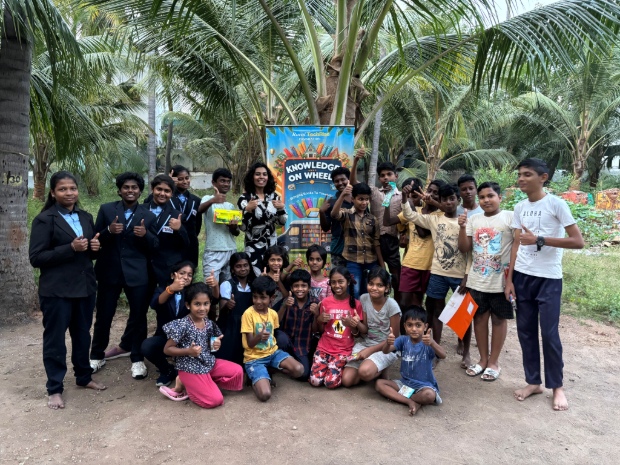
“In the long run, I want to provide scholarships for quality education, bring in global partnerships, and expand our team to a minimum of 100 members. If everyone takes care of their community, no corner of India will be under-educated,” she says.
With her unwavering dedication, Harshini is not just imparting technical skills — she’s shaping young minds, fostering self-reliance, and redefining the future for thousands of rural children. In a world where lack of time is often an excuse to avoid social work, Harshini proves that all you need is passion and dedication to make a difference!
Edited by Arunava Banerjee. All images courtesy Harshini Kishore Singh.
